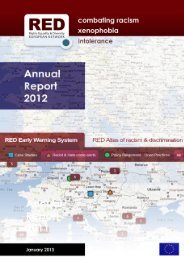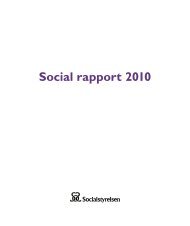R38PITFALLS AND BIAS<strong>and</strong> had to repeat <strong>the</strong> fourth grade. During <strong>the</strong> next school year he was bullied <strong>and</strong> teased for having gone to a“special school,” <strong>and</strong> his mo<strong>the</strong>r eventually transferred him to a primary school attended almost exclusively by<strong>Romani</strong> children. There is no legal mechanism or procedure for re-assessing pupils to determine if <strong>the</strong>ir placementshould be reconsidered or changed. Only if <strong>the</strong>re is a “significant change in special educational needs,” which isleft undefined, will <strong>the</strong>re be a reassessment or review <strong>of</strong> a pupil’s placement (Decree 73/2005 §9.3) <strong>and</strong> this reexaminationmust be requested by <strong>the</strong> child’s parent or legal guardian.TESTS USED FOR ASSESSING SCHOOL READINESS AND ABILITYThe methods <strong>of</strong> assessment by which <strong>Romani</strong> pupils were placed into special schools was one <strong>of</strong> <strong>the</strong> considerations<strong>of</strong> <strong>the</strong> European Court <strong>of</strong> Human Rights in <strong>the</strong>ir judgment against <strong>the</strong> Czech Republic in <strong>the</strong> case <strong>of</strong> D.H. <strong>and</strong>O<strong>the</strong>rs v. Czech Republic. The decision cited observations by <strong>the</strong> International Step by Step Association, <strong>the</strong> RomaEducation Fund, <strong>and</strong> <strong>the</strong> European Early Childhood <strong>Research</strong> Association, <strong>and</strong> concluded that language <strong>and</strong> culture,prior learning experiences, or lack <strong>of</strong> familiarity with testing situations were not considered in <strong>the</strong> assessment<strong>of</strong> <strong>Romani</strong> children in this case. The court also cited <strong>the</strong> fact that “[t]esting was done in a single administration,not over time. Evidence was not obtained in realistic or au<strong>the</strong>ntic settings where children could demonstrate<strong>the</strong>ir skills. Undue emphasis was placed on individually administered, st<strong>and</strong>ardized tests normed on o<strong>the</strong>r populations”(paragraph 44). An example <strong>of</strong> <strong>the</strong> bias that is inherent in psychological tests, <strong>of</strong> not taking into account <strong>the</strong>ways that children experience <strong>the</strong> world, is recounted by Bedard (2008, 30) where a psychologist asked a <strong>Romani</strong>girl where her mo<strong>the</strong>r goes to buy bread <strong>and</strong> <strong>the</strong> girl replied, “To <strong>the</strong> Vietnamese guy’s place.” Even though <strong>the</strong>owner <strong>of</strong> <strong>the</strong> bakery where her mo<strong>the</strong>r shopped was in fact Vietnamese, <strong>the</strong> psychologist told <strong>the</strong> mo<strong>the</strong>r that<strong>the</strong> answer was incorrect, that she should have replied, “To <strong>the</strong> bakery.” Bedard (2008) also provides anecdotalevidence that psychological examinations <strong>of</strong> <strong>Romani</strong> children tend to last between 15-30 minutes, far less than<strong>the</strong> time it would take to conduct a thorough examination, collecting multiple data points through observations,interviews, <strong>and</strong> family histories in making a determination <strong>of</strong> disability status or a recommendation <strong>of</strong> placementto special schools.In an report commissioned by <strong>the</strong> government on <strong>the</strong> analysis <strong>of</strong> diagnostic tools used with children from sociallydisadvantaged backgrounds, including <strong>Romani</strong> children, Valenta <strong>and</strong> colleagues (2009) quote <strong>the</strong> Report <strong>of</strong> <strong>the</strong>Government on General Measures Exercising <strong>the</strong> Judgments <strong>of</strong> <strong>the</strong> ECHR (Government Resolution No. 303 <strong>of</strong> 16 March2006), where <strong>the</strong> government states that it will take corrective measures <strong>and</strong> conduct an analysis <strong>of</strong> assessmentsused to diagnose intellectual ability <strong>of</strong> children that are used by Educational <strong>and</strong> Psychological Counseling <strong>and</strong>Special Educational Centers. Thus, <strong>the</strong> study was charged with collecting data on <strong>the</strong> validity <strong>of</strong> <strong>the</strong> assessmentswith <strong>Romani</strong> children who are at risk <strong>of</strong> being or who are socially excluded, including <strong>the</strong> methods by whichpsychological <strong>and</strong> counseling workers test children from diverse backgrounds <strong>and</strong> factors that can influence <strong>the</strong>test results, with <strong>the</strong> goal <strong>of</strong> improving <strong>the</strong> quality <strong>and</strong> cultural relevance <strong>of</strong> diagnostic tools <strong>and</strong> <strong>the</strong> interpretations
R39<strong>of</strong> <strong>the</strong> results (6). The analysis provided an overview <strong>of</strong> <strong>the</strong> tests most commonly used in <strong>the</strong> Czech Republic <strong>and</strong>attempted to address whe<strong>the</strong>r or not <strong>the</strong>se diagnostic instruments were sufficiently culturally “neutral” for pupilsfrom socially disadvantaged backgrounds (Valenta et al. 2009, 72). The analysis found that <strong>the</strong>se instruments infact “can be considered valid, when used in <strong>the</strong> procedure lege artis (qualified use, experience, dynamism, complexity,sensitivity, etc.)” (72). While tests might be considered neutral, test scores can be rendered unreliable <strong>and</strong> invalidfor reasons such as not following test protocol, administering <strong>the</strong> test in linguistically <strong>and</strong> culturally inappropriateways, language skills <strong>of</strong> examinee, <strong>the</strong> child’s rapport with <strong>the</strong> examiner, <strong>and</strong> bias on <strong>the</strong> part <strong>of</strong> <strong>the</strong> examiner.Therefore, <strong>the</strong> authors recommend that <strong>the</strong> government identify, st<strong>and</strong>ardize, <strong>and</strong> ensure <strong>the</strong> use <strong>of</strong> st<strong>and</strong>ardtest protocols <strong>and</strong> procedures in administering, scoring, interpreting, <strong>and</strong> diagnosing children from culturally <strong>and</strong>linguistically diverse groups in School Advisory Facilities, with an emphasis on awareness <strong>of</strong> bias against <strong>and</strong>increased acceptance <strong>of</strong> <strong>the</strong> linguistic, cultural <strong>and</strong> personal-social specifics <strong>of</strong> <strong>the</strong> Roma ethnic group (71).Stanford-BinetThe Stanford-Binet, based on <strong>the</strong> original 1905 Binet-Simon Scale <strong>and</strong> <strong>the</strong> subsequent revisions by Terman in 1916,was translated to Czech <strong>and</strong> Slovak in 1972, <strong>and</strong> while items were adapted for Czech <strong>and</strong> Slovak culture, <strong>the</strong> testremained st<strong>and</strong>ardized on American norms. The fourth revision was st<strong>and</strong>ardized with Czech norms. The testdoes have some nonverbal items, but among identified weaknesses <strong>of</strong> <strong>the</strong> test are that <strong>the</strong> test is highly dependenton communication skills in Czech <strong>and</strong> that scores are typically lower for children from minority populations(Valenta et al. 2009, 26, 67)Wechsler Intelligence Test for Children, Third UK Edition (WISC-III UK)The Institute for Pedagogical <strong>and</strong> Psychological Counseling was charged with st<strong>and</strong>ardizing <strong>the</strong> WISC-III UK for <strong>the</strong>Czech population in order “to eliminate <strong>the</strong> existing practice <strong>of</strong> too many children placed in special schoolswithout reasonable justification based on <strong>the</strong>ir intellectual <strong>and</strong> learning ability” (Resolution No. 686/1997). TheCzech st<strong>and</strong>ardization has been available since 2002. The test was normed on a group <strong>of</strong> 1457 children, with asix-percent sample <strong>of</strong> <strong>Romani</strong> children. <strong>Romani</strong> children were found to perform poorly in verbal <strong>and</strong> non-verbalsubtests, but performed best in speed <strong>and</strong> symbol searching subtests, where <strong>Romani</strong> children were found tohave insignificantly lower scores than a comparable sample <strong>of</strong> non-<strong>Romani</strong> Czech children (D.H. <strong>and</strong> O<strong>the</strong>rs v. CzechRepublic judgment 2007, paragraph 45). However, <strong>the</strong> rate <strong>of</strong> placement <strong>of</strong> <strong>Romani</strong> children in Czech (special)practical schools remains very high. The previous edition <strong>of</strong> <strong>the</strong> WISC, which is very possibly still in use, was st<strong>and</strong>ardizedin Great Britain only <strong>and</strong> is not culturally relevant for <strong>Romani</strong> children (Cahn <strong>and</strong> Chirico 1999, 54). Sejrková(2000) critiques <strong>the</strong> suitability <strong>of</strong> <strong>the</strong> translation <strong>of</strong> subtest items <strong>of</strong> <strong>the</strong> previous edition <strong>of</strong> <strong>the</strong> WISC-III <strong>and</strong> determinesthat some <strong>of</strong> <strong>the</strong> items might not be comprehensible to <strong>the</strong> Czech population in general due to inaccuracies intranslation.
- Page 3 and 4: R3CONTENTSACKNOWLEDGMENTS 4EXECUTIV
- Page 5 and 6: R5EXECUTIVE SUMMARYThis policy pape
- Page 7: R7For Romani children in Central an
- Page 10 and 11: R10PITFALLS AND BIAS4. Discontinue
- Page 12 and 13: R12PITFALLS AND BIASINTRODUCTIONThe
- Page 14 and 15: R14PITFALLS AND BIASa child is read
- Page 16 and 17: R16PITFALLS AND BIASthe child (Ryan
- Page 18 and 19: R18PITFALLS AND BIASTABLE 2. Placem
- Page 20 and 21: R20PITFALLS AND BIASAMONG THE ROOTS
- Page 22 and 23: R22PITFALLS AND BIASTAXONOMY OF “
- Page 24 and 25: R24PITFALLS AND BIASdevelop the ver
- Page 26 and 27: R26PITFALLS AND BIAS2008, 136). Ard
- Page 28 and 29: R28PITFALLS AND BIASBias in test ad
- Page 30 and 31: R30PITFALLS AND BIASWhile the test
- Page 32 and 33: R32PITFALLS AND BIASOF ROMANI CHILD
- Page 34 and 35: R34PITFALLS AND BIAStwo distinct ty
- Page 36 and 37: R36PITFALLS AND BIASPOLICY AND PRAC
- Page 40 and 41: R40PITFALLS AND BIASOrientation Tes
- Page 42 and 43: R42PITFALLS AND BIASTABLE 5. Educat
- Page 44 and 45: R44PITFALLS AND BIASCOUNTRY-SPECIFI
- Page 46 and 47: R46PITFALLS AND BIASPLACEMENT IN SP
- Page 48 and 49: R48PITFALLS AND BIASCompulsory scho
- Page 50 and 51: R50PITFALLS AND BIASand Educational
- Page 52 and 53: R52PITFALLS AND BIAS121.1.cc.ii). A
- Page 54 and 55: R54PITFALLS AND BIASTest of School
- Page 56 and 57: R56PITFALLS AND BIASof the overall
- Page 58 and 59: R58PITFALLS AND BIASAS WITH OTHER C
- Page 60 and 61: R60PITFALLS AND BIASfirst grade, or
- Page 62 and 63: R62PITFALLS AND BIASbases listed in
- Page 64 and 65: R64PITFALLS AND BIASof Societies in
- Page 66 and 67: R66PITFALLS AND BIASTABLE 13. Pupil
- Page 68 and 69: R68PITFALLS AND BIASROMANI CHILDREN
- Page 70 and 71: R70PITFALLS AND BIASdetermined to c
- Page 72 and 73: R72PITFALLS AND BIASdeveloped in th
- Page 74 and 75: R74PITFALLS AND BIASWechsler Intell
- Page 76 and 77: R76PITFALLS AND BIAStheir chances t
- Page 78 and 79: R78PITFALLS AND BIASREPRESENTATION
- Page 80 and 81: R80PITFALLS AND BIASTABLE 20.Enroll
- Page 82 and 83: R82PITFALLS AND BIAS
- Page 84 and 85: R84PITFALLS AND BIASGOOD PRACTICE A
- Page 86 and 87: R86PITFALLS AND BIASStudent assessm
- Page 88 and 89:
R88PITFALLS AND BIASThe United King
- Page 90 and 91:
R90PITFALLS AND BIASor assistance i
- Page 92 and 93:
R92PITFALLS AND BIASTeachers report
- Page 94 and 95:
R94PITFALLS AND BIASTHE DETERMINATI
- Page 96 and 97:
R96PITFALLS AND BIASintellectual di
- Page 98 and 99:
R98PITFALLS AND BIAS8. Ensure that
- Page 100 and 101:
R100PITFALLS AND BIASANNEX 1:RELIAB
- Page 102 and 103:
R102PITFALLS AND BIAS1. Does the te
- Page 104 and 105:
R104PITFALLS AND BIASANNEX 2:COMPON
- Page 106 and 107:
R106PITFALLS AND BIASFIGURE A4. Sam
- Page 108 and 109:
R108PITFALLS AND BIASAshton-Warner,
- Page 110 and 111:
R110PITFALLS AND BIASCahn, Claude,
- Page 112 and 113:
R112PITFALLS AND BIASD.H. and Other
- Page 114 and 115:
R114PITFALLS AND BIASFigueroa, Rich
- Page 116 and 117:
R116PITFALLS AND BIASGovernment of
- Page 118 and 119:
R118PITFALLS AND BIASHayman, Robert
- Page 120 and 121:
R120PITFALLS AND BIASKovács-Cerovi
- Page 122 and 123:
R122PITFALLS AND BIASMacura-Milovan
- Page 124 and 125:
R124PITFALLS AND BIASMoore, Tom. 20
- Page 126 and 127:
R126PITFALLS AND BIASRadivojevic, D
- Page 128 and 129:
R128PITFALLS AND BIASShepard, Lorri
- Page 130 and 131:
R130PITFALLS AND BIASTomatová, Jan
- Page 132 and 133:
R132PITFALLS AND BIASVláda Česká
- Page 134:
Copyright © 2012 Roma Education Fu




